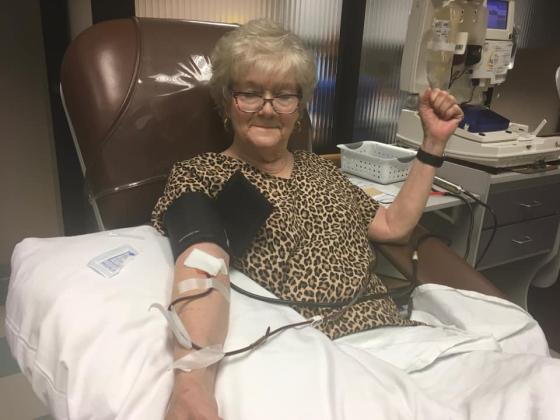Double-digit daily confirmations of new COVID-19 cases in Beaumont, hundreds of cases attributed to Jefferson County prisons and a tripling of the number of coronavirus diagnoses in Hardin County have local leaders – as well as Texas Gov. Greg Abbott – warning Southeast Texans to continue CDC-recommended judicious hand-washing, social distancing and mask-wearing to stem the spread of the disease. For those who do contract COVID-19, however, Baptist Beaumont Hospital COVID Unit Lead Intensivist Dr. Qamar Arfeen, MD, FCCP, said the key to survival is going to the hospital for care before it’s too late.
“We have taken care of tons of patients and we have had two people die in the last months… one type AB, no plasma available; the other came very late to the hospital with an oxygen level of 59,” Arfeen explained. “When they come so late, it’s hard for us to give drugs enough time to fight the infection in your body.
“Any time you have trouble breathing, it’s time to come to the hospital.”
Certain populations have been noted as having a higher susceptibility to negative outcomes of COVID-19 – diabetics, those with heart problems and senior citizens, notably. Knowing the trend, when 73-year-old Larry Stevens and wife, Dee, contracted the virus in mid-March while attending a concert at MacKenzie’s Pub, the couple was understandably concerned for their survival.
The year leading up to the COVID diagnoses had already been hard on Dee and Larry Stevens. In June 2019, Larry had the first of a series of surgeries to combat cancer, prostate problems and a hernia. In September, the couple flooded out of their Beaumont home. October brought Dee busted kneecaps and landed her in the infirmary. Then to top it off, both were diagnosed with COVID-19 and admitted to Baptist Beaumont Hospital, where their three-month journey to surviving the deadly disease would begin.
“'I’m not gonna make it,’ he said,” Dee said of Larry’s decision to go to the hospital on March 18. Although he had no cough and no fever, “He was feeling horrible.”
He wasn’t in the hospital long, either, when the family was informed that Larry wasn’t doing well. By Sunday, March 22, Larry was intubated on a ventilator and his family began to anticipate the worst.
“I love you and tell my daughter I love her. They’re putting me on life support,” Larry told his wife before hanging up the phone and succumbing to the heavy drugs that caused him to sleep for weeks. During the time he was under, Larry recalls vivid nightmares that seemed all-too-real and ensured his sleep would be anything but restful. Dee, home worried about her husband, was then also admitted to the hospital with a positive COVID-19 diagnosis. According to Dee, on March 26, “I started running fever. I had pneumonia, too, and I didn’t even have a clue.”
While Dee was able to recover without being admitted to ICU, Larry was touch-and-go, with doctors unsure of his ability to recover – not that it would hinder the around-the-clock care given to save his life, at the hospital, and at the two rehab facilities where Larry continued his three-month path to being COVID-free.
“He couldn’t have had any better care anywhere,” Dee said. Once recovered, Dee made a point to be with her husband as he fought for his life. Even though she couldn’t be by his side – due to limited visitation at the medical facilities – she could be by his window. Rain or shine, Dee would sit outside Larry’s window so he wouldn’t have to fight the disease solo. Daughter, nurse Whitney Trahan, also did her part to keep Larry’s spirits high, even if it meant a little lying for a good cause.
“She told me I tested negative for COVID – that I was cured,” Larry said, now realizing Whitney couldn’t have known any such thing at that time. “But, I needed that. It gave me the strength to continue fighting – especially since I was ‘cured.’”
Family, prayer and an amazing staff of doctors and nurses at Baptist Hospital and the rehabilitation centers are credited for being the reason Larry is still here today.
“They saved his life,” Dee said.
Although he survived, Larry at 6-foot-4 has lost so much weight that he finds himself weak at times. Battling back to health, Larry is just happy to be alive.
“If I could go in and thank each one of them, I would,” Larry said. “When I didn’t care, they did.
“We were down to dead. My daughter was already selling my cars. I prayed God would let me die. I was down to nothing.
“This stuff is bad news. There was tons of this I don’t even remember.”
“The key is to give the patient the right medicine at the right time,” Dr. Arfeen reiterated. “We want to do everything possible to keep you from going on the vent. Seek help right away if you’re having trouble breathing. My goal is to not have a patient in the ICU. I want them to get treatment in the regular COVID Unit and get them home. The people who have a tough go are people who come late to the emergency room.
“I don’t like people dying on me.”
On average, according to the COVID doctor, Baptist Hospital has seen a steady number of patients daily, “easily 40-plus admissions in last month.”
Beaumont’s surge of coronavirus cases even made news during Gov. Greg Abbott’s state briefing on June 16.
“There has been an increase in people testing positive,” Abbott said. Big boosts in COVID-19 positive cases, Abbott explained, typically have attributed explanations for the uptick. In Beaumont, specifically, Abbott pointed to cluster testing in Jefferson County’s expansive prison population.
“Jails,” he said, “have returned the highest positivity rate that we have seen in the state of Texas.”
Texas Department of Criminal Justice PIO Robert Hurst pointed to information from prison officials that detailed the department’s COVID-19 testing undertaking. The TDCJ, in coordination with the Texas Division of Emergency Management, began an aggressive testing campaign in May, testing more than 125,000 staff and inmates statewide to date. In Beaumont on June 10, that resulted in 520 cases of confirmed COVID-19 in lockup. Still, beginning July 1, TDCJ anticipates resuming intake of offenders from county jails on a limited basis.
“The TDCJ will coordinate with each county and go through a COVID-19 screening process to ensure the offender is suitable for intake. Once the individual arrives, he or she will be screened by medical personnel and housed separately from the general TDCJ population for at least 14 days. The individual will then be transferred to a COVID-free housing area in the general population. The agency will initially bring in approximately 250 offenders a week and will monitor data to make decisions about expansion.”
Aside from mass prison testing adding to Texas’ COVID case count, other behavior is also notably contributing to the upward momentum of COVID-19. Bar visits – and failure to abide by protocol and standards to stop the spread of COVID-19 – were at the top of the governor’s list as well.
“Clearly the standards are not being followed,” he said. “Today is going to be another new high,” Abbott added, reporting an additional 2,622 confirmed COVID-19 cases for June 16 alone. Is Texas then on the verge of another quarantine? Not likely, he explained.
“We do not have to choose between returning to jobs OR protecting health care… we can protect both of those ends… if everyone follows safe strategies to prevent the spread of COVID-19,” Abbott said. “COVID-19 hasn’t suddenly left the state of Texas,” but residents are urged to “protect their own health” moving forward.
“Wearing a mask, washing your hands, keeping your distance … is in your ability and responsibility,” he added. “You can go about your daily functions without spreading COVID-19.”
Following Abbott’s briefing, leaders of local communities addressed additional COVID-19 cases announced later June 16. Beaumont acknowledged 20 more cases June 16; another 15 announced June 17. Port Arthur reported nine additional cases June 16; one in Nederland on June 17.
In Hardin County, Judge Wayne McDaniel reported a tripling effect the same day.
“Please remember,” McDaniel spoke to constituents, “that this coronavirus is still here, and it does not appear that it’s going away.”
Still, like the governor, McDaniel doesn’t foresee a return to the “quarantine” stay home order days.
“We had to do so in March due to limited resources to handle a large outbreak,” he explained. “Those resources are available now and I do not foresee that a statewide or local Stay At Home order will be issued.”
However, as more and more Southeast Texans are being diagnosed with COVID-19, more and more businesses are having to shutter in response. This past week, Beaumont-based Carmela’s Mexican Restaurant and J. Wilson’s restaurant closed after positive COVID-19 cases, as did the Orangefield ISD athletic team. Orangefield ISD Superintendent Shaun McAlpin notified the media on June 15 that the school district was canceling its UIL summer workouts “until further notice” due to possible COVID exposure.
“As more businesses are opening, the health department is encouraging all citizens to remain vigilant about maintaining social distance,” Port Arthur Health Department Director LaTasha Mayon warned. “If you are in a place where social distancing cannot be maintained, a face covering should be used. This is still a very serious situation, and we are not yet in the position of relaxing our efforts of using those non-pharmaceutical interventions.”
Dr. Arfeen, too, extolled the benefits of taking proper precaution during the pandemic.
“Masks basically prevent you from touching your face,” he said, adding that, as precautions are enhanced, contraction goes down.
“In early days, only one nurse contracted COVID,” Arfeen said. “For the past two months or so, we haven’t had a single case.
“Will a surge happen? Most probably,” Arfeen acknowledged. “Our ICU beds are limited, but if people come in at the right time, we keep our ICU from getting full. If you go on the ventilator, you’re on there for 7 – 10 days. It’s a slow process. You either slowly, slowly stop getting worse – or you don’t.
“It’s not a fun disease to have.”
Medical breakthroughs added to the “amazing” success of COVID survivor plasma treatment therapy has resulted in much fewer deaths than recoveries, Arfeen gave as hope for the future.
“Everyday we have people going home; today, there were three going home,” he said June 17. “It’s scary, but the bright side is there is treatment options available. Good nursing, good hospital, good care.
“If people would be cautious about spreading COVID in the community, we’d be in good shape.”


